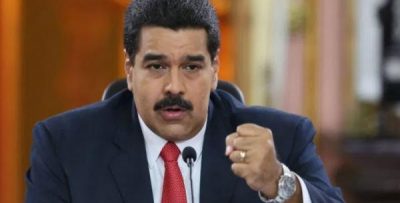De-Dollarization Spikes – Venezuela Stops Accepting Dollars for Oil Payments
Did the doomsday clock on the petrodollar (and implicitly US hegemony) just tick one more minute closer to midnight?

Apparently confirming what President Maduro had warned following the recent US sanctions, The Wall Street Journal reports that Venezuela has officially stopped accepting US Dollars as payment for its crude oil exports.
As we previously noted, Venezuelan President Nicolas Maduro said last Thursday that Venezuela will be looking to “free” itself from the U.S. dollar next week. According to Reuters,
“Venezuela is going to implement a new system of international payments and will create a basket of currencies to free us from the dollar,” Maduro said in a multi-hour address to a new legislative “superbody.” He reportedly did not provide details of this new proposal.
Maduro hinted further that the South American country would look to using the yuan instead, among other currencies.
“If they pursue us with the dollar, we’ll use the Russian ruble, the yuan, yen, the Indian rupee, the euro,” Maduro also said.
* * *
And today, as The Wall Street Journal reports, in an effort to circumvent U.S. sanctions, Venezuela is telling oil traders that it will no longer receive or send payments in dollars, people familiar with the new policy said.
Oil traders who export Venezuelan crude or import oil products into the country have begun converting their invoices to euros.
The state oil company Petróleos de Venezuela SA, known as PdVSA, has told its private joint venture partners to open accounts in euros and to convert existing cash holdings into Europe’s main currency, said one project partner.
The new payment policy hasn’t been publicly announced, but Vice President Tareck El Aissami, who has been blacklisted by the U.S., said Friday, “To fight against the economic blockade there will be a basket of currencies to liberate us from the dollar.“
There is no major market reaction for now – a modest bid to Bitcoin and some weakness in EUR and Gold (seems someone wants this to look like nothing).

However, as Nomura debt analyst Siobhan Morden warns:
“You can say whatever you want for your domestic propaganda and make it look like you’re retaliating against the U.S…. This political posturing will only be to their detriment.”
So what happens if Europe also sanctions Venezuela? Will Rubles or Yuan… or Gold be the only way to buy Venezuela’s oil?
* * *
This decision by the nation with the world’s largest proven oil reserves comes just days after China and Russia unveiled the latest Oil/Yuan/Gold triad at the latest BRICS conference.
It’s when President Putin starts talking that the BRICS reveal their true bombshell. Geopolitically and geo-economically, Putin’s emphasis is on a “fair multipolar world”, and “against protectionism and new barriers in global trade.” The message is straight to the point.
“Russia shares the BRICS countries’ concerns over the unfairness of the global financial and economic architecture, which does not give due regard to the growing weight of the emerging economies. We are ready to work together with our partners to promote international financial regulation reforms and to overcome the excessive domination of the limited number of reserve currencies.”
“To overcome the excessive domination of the limited number of reserve currencies” is the politest way of stating what the BRICS have been discussing for years now; how to bypass the US dollar, as well as the petrodollar.
Beijing is ready to step up the game. Soon China will launch a crude oil futures contract priced in yuan and convertible into gold.
This means that Russia – as well as Iran, the other key node of Eurasia integration – may bypass US sanctions by trading energy in their own currencies, or in yuan.
Inbuilt in the move is a true Chinese win-win; the yuan will be fully convertible into gold on both the Shanghai and Hong Kong exchanges.
The new triad of oil, yuan and gold is actually a win-win-win. No problem at all if energy providers prefer to be paid in physical gold instead of yuan. The key message is the US dollar being bypassed.
RC – via the Russian Central Bank and the People’s Bank of China – have been developing ruble-yuan swaps for quite a while now.
Once that moves beyond the BRICS to aspiring “BRICS Plus” members and then all across the Global South, Washington’s reaction is bound to be nuclear (hopefully, not literally).
Washington’s strategic doctrine rules RC should not be allowed by any means to be preponderant along the Eurasian landmass. Yet what the BRICS have in store geo-economically does not concern only Eurasia – but the whole Global South.
Sections of the War Party in Washington bent on instrumentalizing India against China – or against RC – may be in for a rude awakening. As much as the BRICS may be currently facing varied waves of economic turmoil, the daring long-term road map, way beyond the Xiamen Declaration, is very much in place.
* * *
Having threatened China today with exclusion from SWIFT, we suspect Washington is rapidly running out of any great ally to sustain the petrodollar-driven hegemony (and implicitly its war machine). Cue the calls for a Venezuelan invasion in 3…2..1…!
Featured image is from the author.

